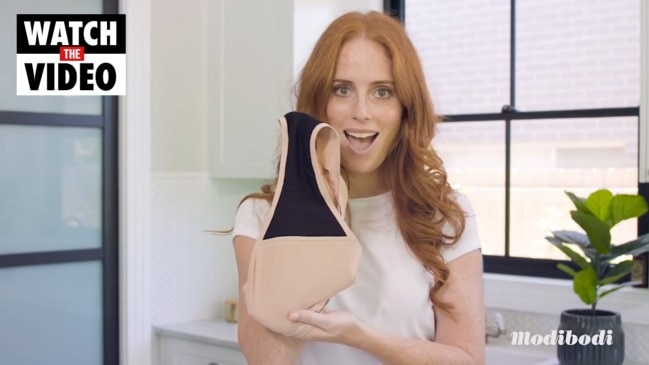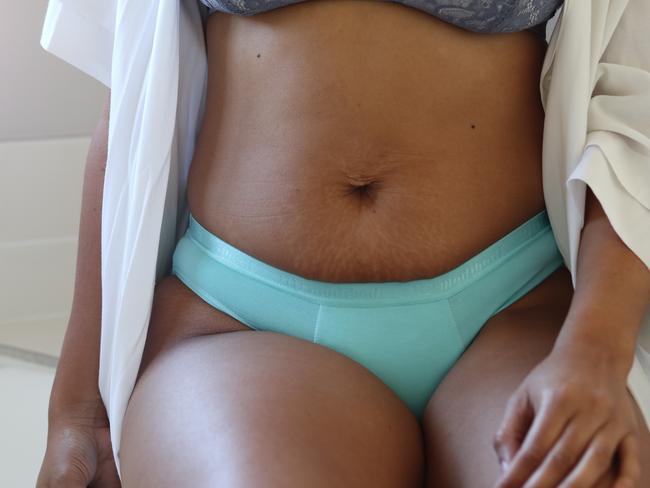How Modibodi founder turned her savings into $3 million business
Mum of four Kristy Chong knew she had a great idea for a product but first of all she had to stop people being “squeamish”.

Costs
Don't miss out on the headlines from Costs. Followed categories will be added to My News.
These days, the word ‘disrupter’ is overused, but when it comes to Kristy Chong it’s perfectly fitting.
When the mum of four founded Modibodi, a range of sustainable, hi-tech undies that replace the need for tampons and pads, she revolutionised an entire industry.
She’s now sold more than four million pairs of underwear globally, enjoyed a 929 per cent revenue growth in the past two years and won numerous awards.
Not bad for a company that was completely self-funded by Ms Chong’s savings and a small amount of seed funding taken from her mortgage. Or for an idea that just came to her as she was out jogging one day.
“I was a full-time mum of a two-year-old and five-month-old at the time, living in Seattle surrounded by tech start-ups,” she explains.
“My periods had not long returned and I’d been experiencing occasional light bladder leaks. The available solutions were ugly, inconvenient, uncomfortable and a hazard to our environment – disposable hygiene. I just felt we deserved something better.
“I also couldn’t understand why with all the advancements in technology, underwear and disposable hygiene had not evolved. I knew instantly that I was going to have to create a whole new product category for women.”

RELATED: Sleep-deprived mum’s $30 million idea
It was an audacious idea, especially for someone who admits that at that point they had “zero knowledge of chemistry and textiles,” but unperturbed, she started working on developing the brand’s patented Modifier Technology.
“I spoke to close to 100 experts and fibre companies, both in the USA and Australia, and conducted almost 1,000 scientific tests before I was happy with the technology,” she says.
But it wasn’t developing the product, or funding the business herself, or caring for two children while trying to start a new business that were the biggest hurdles she faced in establishing Modibodi but rather, how squeamish people were about the concept.
“The biggest, ongoing challenge is around breaking the taboos around periods, sweat and incontinence,” she explains.
“We want to positively empower all people to speak openly about what is a very common or normal part of life.
“Last year, we launched our The New Way to Period advertising campaign, which received some backlash due to showing blood. We want to normalise menstruation and break down stereotypes … We’ve made strides, but we still have a long way to go in destigmatising menstruation and bodily leaks.”
Despite the reservations of some, Modibodi’s growth has been exponential, within the first three years of launching, the business made $3 million and now customers worldwide are embracing the Aussie brand.
As the multi-use knickers mean women can ditch tampons and sanitary pads, of which the average woman will use 12,000 to 16,000 in her lifetime, according to Modibodi, they can save women money too.
RELATED: Savvy dad cuts energy bills by $3600 a year
Making the switch from sanitary products to pants saves on average 30c per disposable item not used, meaning the average Australian woman will save a minimum of $3600. Not bad.
As well as putting extra money in your bank account, the underwear is also great for those who are trying to be more eco-conscious as it significantly reduces the amount of waste being thrown away.
“For under $150 you can manage your period waste free with five pairs of Modibodi reusable underpants, or you could use 1250 disposable products plus some cotton underpants for over $360 – what makes more sense?” asks Ms Chong.
“Even with eight pairs of Modibodi at $230 or 12 pairs of Modibodi at $330, reusable underwear is still more cost-effective over the same period of four years.”
As the business has grown, Ms Chong has expanded Modibodi into new product categories of leak-proof apparel including maternity and activewear, as well as period and pee-proof swimwear.

The most recent launches include Australia’s first 24-hour absorbency underwear and reusable nappies.
But it’s not the product innovations or conquering new global markets that Ms Chong believes to have been her best business decision so far, rather it’s “going into a business that celebrates and empowers everyone”.
And that’s not just spin or public relations conjecture – she really means it.
“Once we’d developed Modibodi, I sought some opinions as to how I should market [it] … I was repeatedly told we’d need super glamorous models to make supposed unmentionable topics tolerable to Australian women and the media,” she explains.
“I refused to believe this was the only way we could have a presence in the market and from day one we’ve sourced customers or everyday people from diverse backgrounds to help model and sell our products.
“Seven years later, we have customers contacting us daily to take part in our photo shoots that celebrate women of every size, ethnicity and age, and you’ll see all types of people in our marketing and advertising, and all remain photoshop free.”
RELATED: Surprising salary boost for remote workers
Originally published as How Modibodi founder turned her savings into $3 million business


